A Lost Paradise
A Lost Paradise (失楽園 Shitsurakuen) is 1997 novel by Japanese author Junichi Watanabe. It tells the story of a 54-year-old married former magazine editor, his affair with a 37-year-old married typesetter and their double-suicide. The couple, Kūki and Rinko, are modeled after the famous case of Sada Abe.
The book became a bestseller throughout Asia, selling 3 million copies in Japan. Shitsurakuen became a slang word for having an affair. It was first serialized in the business newspaper Nihon Keizai Shimbun in 1995.The book was made into a film and a TV drama the same year. The film Lost Paradise was nominated for 13 Japan Academy Prizes winning one with Hitomi Kuroki for lead actress.


website: http://hk.apple.nextmedia.com/international/art/20140506/18710684
Junichi Watanabe
Junichi Watanabe (渡辺 淳一? Watanabe Jun'ichi, October 24, 1933 – April 30, 2014) was a Japanese writer, known for his portrayal of the extra-marital affairs of middle aged people.
His 1997 novel A Lost Paradise became a bestseller in Japan and over Asia, and was made into a film and a TV miniseries. He has written more than 50 novels in total, and won awards including Naoki Prize in 1970 for Light and Shadow (Hikari to kage), New Current Coterie magazine prize for Makeup, the Yoshikawa Eiji Prize in 1979 for The Setting Sun in the Distance (Toki rakujitsu) and The Russian Brothel of Nagasaki (Nagasaki roshia yujokan).
John Milton
John Milton (9 December 1608 – 8 November 1674) was an English poet, polemicist, man of letters, and civil servant for the Commonwealth of England under Oliver Cromwell. He wrote at a time of religious flux and political upheaval, and is best known for his epic poem Paradise Lost (1667), written in blank verse.
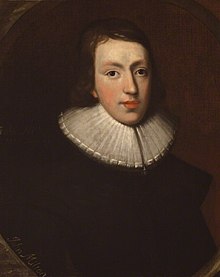
Paradise Lost
Paradise Lost is an epic poem in blank verse by the 17th-century English poet John Milton (1608–1674). The first version, published in 1667, consisted of ten books with over ten thousand lines of verse. A second edition followed in 1674, arranged into twelve books (in the manner of Virgil's Aeneid) with minor revisions throughout and a note on the versification. It is considered by critics to be Milton's major work, and it helped solidify his reputation as one of the greatest English poets of his time.

Iambic pentameter
Iambic pentameter /aɪˈæmbɪk pɛnˈtæmᵻtər/ is a commonly used type of metrical line in traditional English poetry and verse drama. The term describes the rhythm that the words establish in that line, which is measured in small groups of syllables called "feet". The word "iambic" refers to the type of foot that is used, known as the iamb, which in English is an unstressed syllable followed by a stressed syllable. The word "pentameter" indicates that a line has five of these "feet".
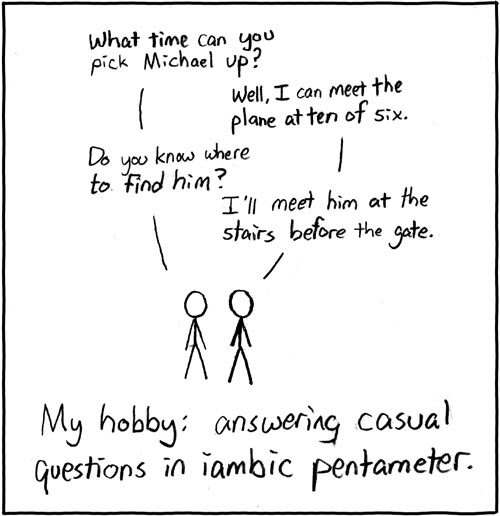

Elegy
In English literature, an elegy is a poem of serious reflection, typically a lament for the dead. The Oxford Handbook of the Elegy notes:
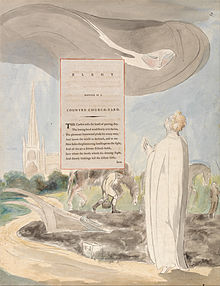

Alliteration
Alliteration is a stylistic literary device identified by the repeated sound of the first letter in a series of multiple words, or the repetition of the same letter sounds in stressed syllables of a phrase. "Alliteration" is from the Latin word littera, meaning "letter of the alphabet", and the first known use of the word to refer to a literary device occurred around 1624. Alliteration narrowly refers to the repetition of a letter in any syllables that, according to the poem's meter, are stressed, as in James Thomson's verse "Come…dragging the lazy languid Line along". Another example is "Peter Piper picked a peck of pickled peppers".
The Raven
"The Raven" is a narrative poem by American writer Edgar Allan Poe. First published in January 1845, the poem is often noted for its musicality, stylized language, and supernatural atmosphere. It tells of a talking raven's mysterious visit to a distraught lover, tracing the man's slow fall into madness. The lover, often identified as being a student, is lamenting the loss of his love, Lenore. Sitting on a bust of Pallas, the raven seems to further instigate his distress with its constant repetition of the word "Nevermore". The poem makes use of a number of folk, mythological, religious, and classical references.
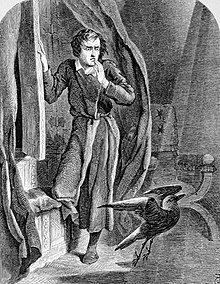
Edgar Allan Poe
Edgar Allan Poe (/poʊ/; born Edgar Poe; January 19, 1809 – October 7, 1849) was an American writer, editor, and literary critic. Poe is best known for his poetry and short stories, particularly his tales of mystery and the macabre. He is widely regarded as a central figure of Romanticism in the United States and American literature as a whole, and he was one of the country's earliest practitioners of the short story. Poe is generally considered the inventor of the detective fiction genre and is further credited with contributing to the emerging genre of science fiction. He was the first well-known American writer to try to earn a living through writing alone, resulting in a financially difficult life and career.

Paul Gauguin
Eugène Henri Paul Gauguin (/ɡoʊˈɡæn/; French: [øʒɛn ɑ̃ʁi pɔl ɡoɡɛ̃]; 7 June 1848 – 8 May 1903) was a French post-Impressionist artist. Underappreciated until after his death, Gauguin is now recognized for his experimental use of color and Synthetist style that were distinctly different from Impressionism. His work was influential to the French avant-garde and many modern artists, such as Pablo Picasso and Henri Matisse. Gauguin's art became popular after his death, partially from the efforts of art dealer Ambroise Vollard, who organized exhibitions of his work late in his career, as well as assisting in organizing two important posthumous exhibitions in Paris. Many of his paintings were in the possession of Russian collector Sergei Shchukin and other important collections.

website: https://www.khanacademy.org/humanities/becoming-modern/avant-garde-france/post-impressionism/v/paul-gauguin-nevermore-1897
To Helen
"To Helen" is the first of two poems to carry that name written by Edgar Allan Poe. The 15-line poem was written in honor of Jane Stanard, the mother of a childhood friend. It was first published in 1831 collection Poems of Edgar A. Poe. It was then reprinted in 1836 in the Southern Literary Messenger.

Primavera
Primavera (Italian pronunciation: [primaˈveːra]), also known as Allegory of Spring, is a tempera panel painting by Italian Renaissance artist Sandro Botticelli painted in the late 1470s or early 1480s (datings vary). It has been described as "one of the most written about, and most controversial paintings in the world", and also "one of the most popular paintings in Western art".
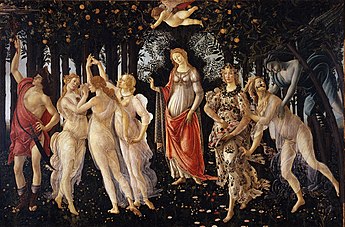
Sandro Botticelli
Alessandro di Mariano di Vanni Filipepi, known as Sandro Botticelli (Italian: [ˈsandro bottiˈtʃɛlli]; c. 1445 – May 17, 1510), was an Italian painter of the Early Renaissance. He belonged to the Florentine School under the patronage of Lorenzo de' Medici, a movement that Giorgio Vasari would characterize less than a hundred years later in his Vita of Botticelli as a "golden age". Botticelli's posthumous reputation suffered until the late 19th century; since then, his work has been seen to represent the linear grace of Early Renaissance painting.
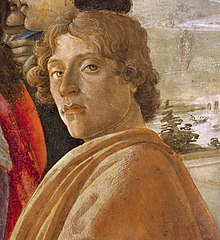
Hyacinthus
Hyacinthus is a small genus of bulbous, fragrant flowering plants in the family Asparagaceae, subfamily Scilloideae. These are commonly called hyacinths /ˈhaɪəsɪnθs/. The genus is native to the eastern Mediterranean (from the south of Turkey through to northern Israel).

Cupid and Psyche
Cupid and Psyche is a story originally from Metamorphoses (also called The Golden Ass), written in the 2nd Century AD by Lucius Apuleius Madaurensis (or Platonicus) It concerns the overcoming of obstacles to the love between Psyche or Amor ("Love", Greek Eros ’′Ερως), and their ultimate union in a sacred marriage. Although the only extended narrative from antiquity is that of Apuleius, Eros and Psyche appear in Greek art as early as the 4th century BC. The story's Neoplatonic elements and allusions to mystery religions accommodate multiple interpretations, and it has been analyzed as an allegory and in light of folktale, Märchen or fairy tale, and myth.

spondee
A spondee (Latin: spondeus) is a metrical foot consisting of two long syllables, as determined by syllable weight in classical meters, or two stressed syllables in modern meters. The word comes from the Greek σπονδή, spondi, "libation".
The spondee typically does not provide the basis for a metrical line in poetry. Instead, spondees are found as irregular feet in meter based on another type of foot.
For example, the epics of Homer and Vergil are written in dactylic hexameter. This term suggests a line of six dactyls, but a spondee can be substituted in most positions. The first line of Vergil's Aeneid has the pattern dactyl-dactyl-spondee-spondee-dactyl-spondee:
- Ārmă vĭrūmquĕ cănō, Troīaē quī prīmŭs ăb ōrīs
W.B.Yeats
William Butler Yeats (/ˈjeɪts/; 13 June 1865 – 28 January 1939) was an Irish poet and one of the foremost figures of 20th-century literature. A pillar of both the Irish and British literary establishments, he helped to found the Abbey Theatre, and in his later years served as an Irish Senator for two terms. Yeats was a driving force behind the Irish Literary Revival along with Lady Gregory, Edward Martyn and others.
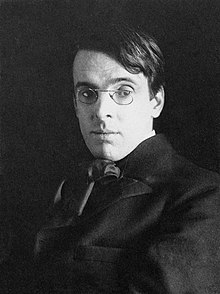
"I Wandered Lonely as a Cloud"
"I Wandered Lonely as a Cloud" (also commonly known as "Daffodils") is a lyric poem by William Wordsworth. It is Wordsworth's most famous work.
The poem was inspired by an event on 15 April 1802, in which Wordsworth and his sister Dorothy came across a "long belt" of daffodils. Written some time between 1804 and 1807 (in 1804 by Wordsworth's own account), it was first published in 1807 in Poems in Two Volumes, and a revised version was published in 1815.

William Wordsworth
William Wordsworth (7 April 1770 – 23 April 1850) was a major English Romantic poet who, with Samuel Taylor Coleridge, helped to launch the Romantic Age in English literature with their joint publication Lyrical Ballads (1798).
Wordsworth's magnum opus is generally considered to be The Prelude, a semiautobiographical poem of his early years that he revised and expanded a number of times. It was posthumously titled and published, before which it was generally known as "the poem to Coleridge". Wordsworth was Britain's Poet Laureate from 1843 until his death from pleurisy on 23 April 1850.

Traveling is a fool's paradise
Transcript of Traveling is a fool's paradise
My tongue, every atom of my blood, form’d from this soil, this air,
Born here of parents born here from parents the same, and their parents the same,
I, now thirty-seven years old in perfect health begin,
Hoping to cease not till death.
Creeds and schools in abeyance,
Retiring back a while sufficed at what they are, but never forgotten,
I harbor for good or bad, I permit to speak at every hazard,
Nature without check with original energy.
website: https://www.poetryfoundation.org/poems-and-poets/poems/detail/45477
https://www.youtube.com/watch?v=AU0PisxDTRI
Walt Whitman
Walter "Walt" Whitman (/ˈhwɪtmən/; May 31, 1819 – March 26, 1892) was an American poet, essayist, and journalist. A humanist, he was a part of the transition between transcendentalism and realism, incorporating both views in his works. Whitman is among the most influential poets in the American canon, often called the father of free verse. His work was very controversial in its time, particularly his poetry collection Leaves of Grass, which was described as obscene for its overt sexuality.
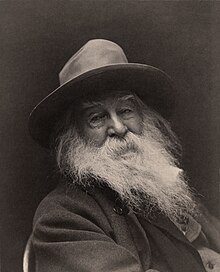
Carpe diem
Carpe diem is a Latin aphorism, usually translated "seize the day", taken from book 1 of the Roman poet Horace's work Odes (23 BC).
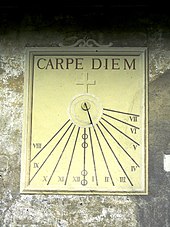
"To His Coy Mistress"
"To His Coy Mistress" is a metaphysical poem written by the English author and politician Andrew Marvell (1621–1678) either during or just before the English Interregnum (1649–60). It was published posthumously in 1681.
This poem is considered one of Marvell's finest and is possibly the best recognized carpe diem poem in English. Although the date of its composition is not known, it may have been written in the early 1650s. At that time, Marvell was serving as a tutor to the daughter of the retired commander of the New Model Army, Sir Thomas Fairfax.
Andrew Marvell
Andrew Marvell (/ˈmɑːrvəl/; 31 March 1621 – 16 August 1678) was an English metaphysical poet, satirist and politician who sat in the House of Commons at various times between 1659 and 1678. During the Commonwealth period he was a colleague and friend of John Milton. His poems range from the love-song "To His Coy Mistress", to evocations of an aristocratic country house and garden in "Upon Appleton House" and "The Garden", the political address "An Horatian Ode upon Cromwell's Return from Ireland", and the later personal and political satires "Flecknoe" and "The Character of Holland".

Metaphysical poets
The term metaphysical poets was coined by the critic Samuel Johnson to describe a loose group of 17th-century English poets whose work was characterized by the inventive use of conceits, and by a greater emphasis on the spoken rather than lyrical quality of their verse. These poets were not formally affiliated and few were highly regarded until 20th century attention established their importance. Given the lack of coherence as a movement, and the diversity of style between poets, it has been suggested that calling them Baroque poets after their era might be more useful. Once the Metaphysical style was established, however, it was occasionally adopted by other and especially younger poets to fit appropriate circumstances.

The poet Abraham Cowley, in whose biography Samuel Johnson first named and described Metaphysical poetry
Dover Beach
"Dover Beach" is a lyric poem by the English poet Matthew Arnold. It was first published in 1867 in the collection New Poems, but surviving notes indicate its composition may have begun as early as 1849. The most likely date is 1851.
The title, locale and subject of the poem's descriptive opening lines is the shore of the English ferry port of Dover, Kent, facing Calais, France, at the Strait of Dover, the narrowest part (21 miles) of the English Channel, where Arnold honeymooned in 1851.
Matthew Arnold
Matthew Arnold (24 December 1822 – 15 April 1888) was an English poet and cultural critic who worked as an inspector of schools. He was the son of Thomas Arnold, the famed headmaster of Rugby School, and brother to both Tom Arnold, literary professor, and William Delafield Arnold, novelist and colonial administrator. Matthew Arnold has been characterised as a sage writer, a type of writer who chastises and instructs the reader on contemporary social issues.

The Good-Morrow
"The Good-Morrow" is a poem by John Donne, published in his 1633 collection Songs and Sonnets.
Written while Donne was a student at Lincoln's Inn, the poem is one of his earliest works and is thematically considered to be the "first" work in Songs and Sonnets. Although referred to as a sonnet, the work does not follow the most common rhyming scheme of such works—a 14-line poem, consisting of an eight-line stanza followed by a six-line conclusion—but is instead 21 lines long, divided into three stanzas. "The Good-Morrow" is written from the point of view of an awaking lover and describes the lover's thoughts as he wakes next to his partner. The lover's musings move from discussing sensual love to spiritual love as he realises that, with spiritual love, the couple are liberated from fear and the need to seek adventure. The poem makes use of biblical and Catholic writings, indirectly referencing the legend of the Seven Sleepers and Paul the Apostle's description of divine, agapic love – two concepts with which, as a practising Catholic, Donne would have been familiar.

A 19th-century German painting of the Seven Sleepers, a Catholic legend Donne references in the opening lines of the poem.
John Donne
John Donne was an English poet and cleric in the Church of England.
He is considered the pre-eminent representative of the metaphysical poets. His works are noted for their strong, sensual style and include sonnets, love poems, religious poems, Latin translations, epigrams, elegies, songs, satires and sermons. His poetry is noted for its vibrancy of language and inventiveness of metaphor, especially compared to that of his contemporaries. Donne's style is characterised by abrupt openings and various paradoxes, ironies and dislocations. These features, along with his frequent dramatic or everyday speech rhythms, his tense syntax and his tough eloquence, were both a reaction against the smoothness of conventional Elizabethan poetry and an adaptation into English of European baroque and mannerist techniques. His early career was marked by poetry that bore immense knowledge of English society and he met that knowledge with sharp criticism. Another important theme in Donne's poetry is the idea of true religion, something that he spent much time considering and about which he often theorized. He wrote secular poems as well as erotic and love poems. He is particularly famous for his mastery of metaphysical conceits.

W. H. Auden
Wystan Hugh Auden was an English-American poet. Auden's poetry was noted for its stylistic and technical achievement, its engagement with politics, morals, love, and religion, and its variety in tone, form and content. He is best known for love poems such as "Funeral Blues", poems on political and social themes such as "September 1, 1939" and "The Shield of Achilles", poems on cultural and psychological themes such as The Age of Anxiety, and poems on religious themes such as "For the Time Being" and "Horae Canonicae." He was born in York, grew up in and near Birmingham in a professional middle-class family. He attended English independent (or public) schools and studied English at Christ Church, Oxford. After a few months in Berlin in 1928–29 he spent five years (1930–35) teaching in English public schools, then travelled to Iceland and China in order to write books about his journeys. In 1939 he moved to the United States and became an American citizen in 1946. He taught from 1941 to 1945 in American universities, followed by occasional visiting professorships in the 1950s. From 1947 to 1957 he wintered in New York and summered in Ischia; from 1958 until the end of his life he wintered in New York (in Oxford in 1972–73) and summered in Kirchstetten, Austria.
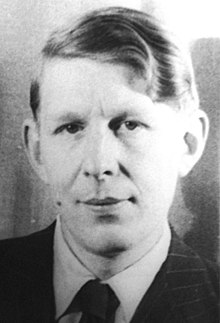
"Stop all the clocks, cut off the telephone"
Stop all the clocks, cut off the telephone,
Prevent the dog from barking with a juicy bone,
Silence the pianos and with muffled drum
Bring out the coffin, let the mourners come.
Let aeroplanes circle moaning overhead
Scribbling on the sky the message He Is Dead,
Put crepe bows round the white necks of the public doves,
Let the traffic policemen wear black cotton gloves.
He was my North, my South, my East and West,
My working week and my Sunday rest,
My noon, my midnight, my talk, my song;
I thought that love would last for ever: I was wrong.
The stars are not wanted now: put out every one;
Pack up the moon and dismantle the sun;
Pour away the ocean and sweep up the wood.
For nothing now can ever come to any good.
Prevent the dog from barking with a juicy bone,
Silence the pianos and with muffled drum
Bring out the coffin, let the mourners come.
Let aeroplanes circle moaning overhead
Scribbling on the sky the message He Is Dead,
Put crepe bows round the white necks of the public doves,
Let the traffic policemen wear black cotton gloves.
He was my North, my South, my East and West,
My working week and my Sunday rest,
My noon, my midnight, my talk, my song;
I thought that love would last for ever: I was wrong.
The stars are not wanted now: put out every one;
Pack up the moon and dismantle the sun;
Pour away the ocean and sweep up the wood.
For nothing now can ever come to any good.
沒有留言:
張貼留言